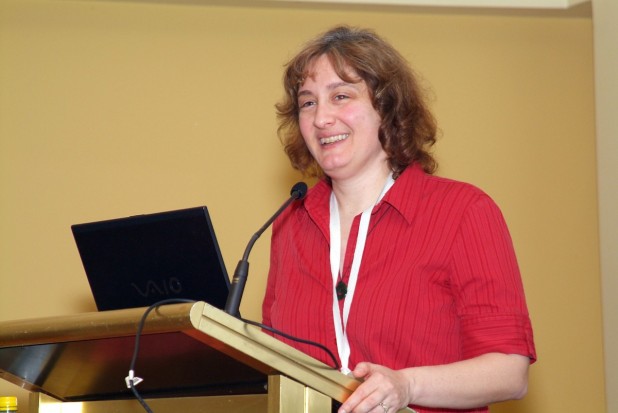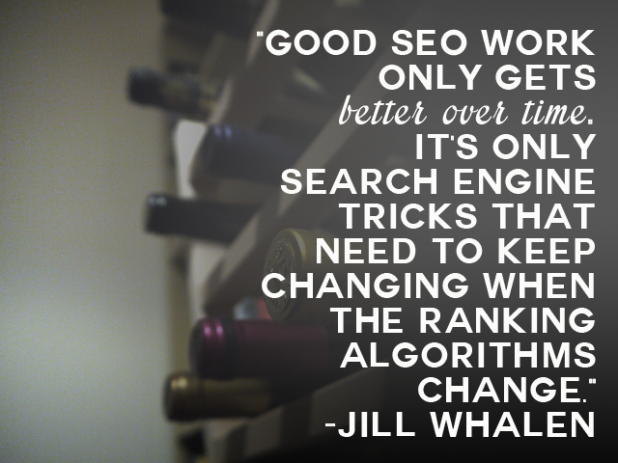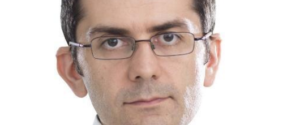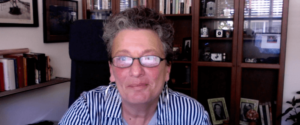



As most of you know, Jill Whalen has been a voice in the SEO industry for more than 18 years. She started practicing SEO in 1993-94, even before the term ‘SEO’ was around. The 20 year long outstanding career came to an end with the announcement of her decision to quit SEO a few months ago. The news rocked the SEO industry and sparked discussions in various SEO communities.
Over a period of 18 years, she consulted with hundreds of clients across more than 40 industries. The company found by her – High Rankings, was one of the pre-eminent SEO companies in the United States.
The Queen of SEO has always been a strong advocate of good SEO practices. As a renowned speaker, trainer and writer she has always preached about the importance of doing good SEO work in order to sustain organic visibility in the long run.
In this interesting interview, Jill Whalen shares some of her insightful views on SEO. We hope you enjoy reading it.
In Conversation with Jill Whalen – Interviewed by Kavin Paulson, editor of The iMarketing Café.
Kavin Paulson: Hi Jill, thank you so much for your time, we are honored to have you featured in The iMarketing Café. Can you tell us something that we do not know about you? 🙂
Jill Whalen: Thanks, Kavin. Hmm…something you may not know about me…well, many probably don’t know that I collect toads. Not real ones, mind you, but figurines, stuffed animals, etc. Most that I have are technically frogs, but I call them toads. 🙂
KP: How has been your life after quitting SEO? What do you do these days?
JW: Life’s been great! I spend my time practicing yoga, shopping for healthy food, cooking, listening to spiritual talks online and meditating. I was also taking a bead jewelry class for awhile and am just starting a clay pottery wheel class. I’ve also started volunteering at a local organization that provides rides for senior citizens.
KP: Tell us about high rankings – the launch, the journey, the achievements and the current status.
JW: High Rankings was the company I founded which consisted mainly of me doing SEO consulting and website marketing for a multitude of companies through the years. I also put out the High Rankings Advisor online newsletter every other week since 2002, and founded the HIgh Rankings Forum in 2003. In addition to consulting, I also used to teach SEO and spoke at many online marketing conferences both nationally and internationally.
Currently, only the forum is still in existence in terms of new content. (I even pop in now and then and answer questions.) However, the hundreds of articles I wrote for the HRA newsletter are all still posted and a good many of them are are still extremely useful and helpful to anyone trying to figure out what SEO and website marketing is all about.
KP: Over the period of 20+ years of your career, how do you think the SEO industry has changed?
JW: SEO itself (at least the way I always did it) hasn’t changed as much as many think it has. However, the industry itself has changed immensely. When I began, there weren’t forums and blogs on the topic. You basically had to learn it through trial and error. It also was a small, close knit industry, but has now grown to be a very important arm of the marketing industry.
KP: From the beginning, you have been against manipulative methods and have always endorsed good SEO practices. What used to be your core strategy to gain search visibility and attract organic traffic in the pre-panda and pre-penguin era when manipulative websites often used to get the edge, in SERP rankings, over sites which purely relied on good SEO practices?
KP: Back then, manipulative practices worked to a great extent. Was it a difficult journey convincing ranking-obsessed clients all the way to adopt good SEO practices?
JW: My core strategy from the very beginning was to teach my clients to provide a website that was free of technical issues that might impede search engine crawlers from being able to index the information it contained. Combined with training them to understand what good content was and how to integrate it into their websites in a way that was both user- and search engine-friendly.
Generally it was not difficult for me to convince my clients to do things the “right way” because they came to me already knowing what my basic methods were. If they were not in agreement with the types of SEO strategies that I promoted, they never would have become my clients in the first place.
KP: In the attempt to control spam, don’t you think Google, at times, unfairly targets genuine content publishers, creators and contributors? Don’t you think Google has been becoming over-aggressive lately? Doc Sheldon’s site, which got penalized recently, is one such case in point (The penalty was revoked after 5 days).
JW: No. I don’t believe that one bit. In my experience, I saw very few sites get unfairly penalized. There are of course, situations where technical issues may cause certain sites to get mistakenly caught up in a new Google filter, but it’s much more rare than some in the SEO industry make it out to be. For the most part, penalties or losses of Google traffic can usually be traced back to specific website issues. The issues may not always be something that was intentionally done to try to trick Google, of course, but are issues that need to be fixed nonetheless.
KP: Google’s aggressive manual penalty drive has given rise of a new ‘link removal’ industry. What’s your take on that?
JW: I think it’s ridiculous. SEO companies charge for spammy links and then when penalized for them charge to remove them. On the other hand, clients of these SEO companies liked the spammy links just fine when they worked to bring them traffic, and therefore are certainly just as much to blame as the SEO companies.
KP: Do you see a major change in the Google results after the hummingbird algorithm? In other words, how effective has the hummingbird algorithm been?
JW: No idea. Hummingbird came about at the tail end of my SEO tenure and I stopped paying attention. That said, it was my understanding that hummingbird was simply a different way of displaying results, not really an algorithm change (although I could be wrong about that).
KP: Despite some laudable efforts made by Google, Spamming still happens. Will there ever be an end to search spam? 🙂
JW: I think it is probably difficult to fully stop the really bad stuff that happens in the highly competitive industries as they’re willing to go to extremes by churning and burning through domains. But, I do think it’s impressive how well Google has done fighting spam up to this point once they put their minds to it in a serious manner.
KP: Some thought leaders and SEO practitioners use the term ‘ modern seo’ these days, which refers to a holistic approach to SEO that involves integration of core SEO with social, content, UX, outreach etc. What’s your opinion on the concept of modern SEO?
JW: By your definition, “Modern SEO” is simply the SEO strategies I’ve been espousing since the beginning. Which is essentially why my voice is no longer necessary in the SEO industry. Everyone has finally come around to doing things the right way! (Which of course is a great thing!)

KP: What is that one piece of advice that you would like to give to upcoming SEOs?
JW: Always think about why you’re doing what you’re doing. The whole idea of SEO is to make websites be the best they can be for users and search engines. Anything that you do that doesn’t fit within those parameters is probably not something that you should be doing.
KP: Where do you see Google five years from now?
JW: 5 years in Internet time is more like 20 in the offline world. I honestly have no idea of the types of things that Google might be doing at that time. Although I would guess that they will continue to be an advertising medium than a search engine, which is the direction they’ve been heading for the past 10 years.
KP: If you could change one thing about Google, What would that be?
JW: Less blending of ads in the organic results.
KP: If you were not an SEO, what would you have been?
JW: Possibly a Montessori teacher.
KP: Where do you see yourself five years from now?
JW: That’s the million dollar question! I don’t really know. I do know that I love public speaking, writing and teaching, so I might be doing something that has those components. But what I’ll be talking and writing about–that I just don’t know yet.
KP: How would you describe yourself in one word?
JW: Jubilant
KP: If you could change something about yourself, what would it be and why?
JW: I’ve been changing a number of things about myself over the past 6 months. I’m not sure what’s left! I guess one thing that would be good to change would be my tendency to procrastinate. Or perhaps my dislike of making phone calls. It’s a toss up!
KP: Is there any chance you will come back to the SEO industry again? 😉
JW: It’s doubtful that I will. Whatever I do next may have some component of marketing simply because I seem to have a knack for that, but no, the SEO industry (if there still even is such a thing) is not in my cards.
KP: On a lighter note, what would you do if you woke up one morning and found out that you had become Matt Cutts? 😀
JW: Cash in my Google stock and travel the world.
KP: Thank you so much Jill. It was great talking to you and all the very best for your future endeavors.
JW: You’re very welcome. Thanks for having me!
You can stay connected with Jill Whalen on Twitter . Visit her blog whatdidyoudowithJill to know more about her post-SEO life.
 Interview: In Conversation with Larry Kim, Founder of WordStream, an Internet Marketing Software Firm.
Interview: In Conversation with Larry Kim, Founder of WordStream, an Internet Marketing Software Firm.
 Interview: In Conversation with Dan Petrovic, Managing Director of DEJAN Marketing
Interview: In Conversation with Dan Petrovic, Managing Director of DEJAN Marketing
 Interview: In Conversation with International SEO Consultant, Gabriella Sannino
Interview: In Conversation with International SEO Consultant, Gabriella Sannino